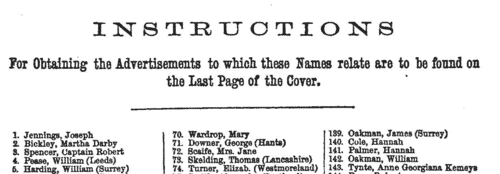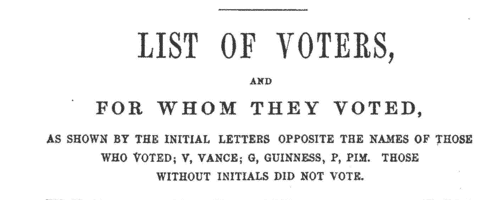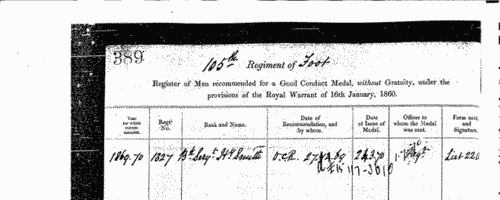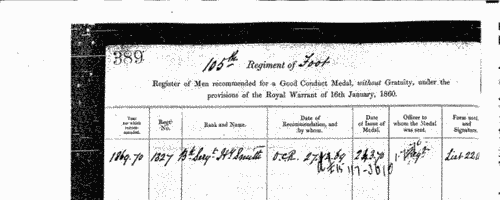Cantwell Surname Ancestry ResultsOur indexes 1000-1999 include entries for the spelling 'cantwell'. In the period you have requested, we have the following 133 records (displaying 71 to 80): Single Surname Subscription | | | Buying all 133 results of this search individually would cost £728.00. But you can have free access to all 133 records for a year, to view, to save and print, for £100. Save £628.00. More... |
These sample scans are from the original record. You will get scans of the full pages or articles where the surname you searched for has been found. Your web browser may prevent the sample windows from opening; in this case please change your browser settings to allow pop-up windows from this site.  British infantry fighting in China
(1856-1860) British infantry fighting in China
(1856-1860)
The China Medal was awarded to soldiers and sailors who took part in the prosecution of the war against the Chinese from 1856 to 1860. Separate clasps were awarded for men who had been in receipt of the China Medal of 1842; for being actually present at Canton on 28 and 29 December 1857, when that city was bombarded and finally captured; for being actually engaged in the operations which ceased with the first capture of the Taku Forts, 20 May 1858, and led to the Treaty of Tientsin; for being actually present at the capture of the Taku Forts 21 August 1860; and for being actually present before Pekin the day the gate of that city was given up to the allied (British and French) army, viz. on 13 October 1860. The 67th (The South Hampshire) Regiment of Foot, based at Athlone, embarked for India 18 September 1858, and was transferred to China in 1859, taking part in the capture of the Taku Forts and Pekin, and the operations against the Taiping rebels in 1862 to 1863: the right wing was moved to Japan in 1864 for the occupation of Yokohama. The regiment returned to the Cape of Good Hope in 1865, and back to Ireland in 1866.CANTWELL. Cost: £8.00.  | Sample scan, click to enlarge

|  Sailors and marines on board Her Majesty's ship Calcutta
(1856-1860) Sailors and marines on board Her Majesty's ship Calcutta
(1856-1860)
The China Medal was awarded to soldiers and sailors involved in the various actions of the war against China, in which this ship was engaged from 1856 to 1860. The medals were either delivered on board or sent on in 1862: except that many of the men were no longer immediately traceable, and the remarks on the roll show that some medals were not sent on for several years, and some were never sent. After the main roll there is a section showing which of the men also qualified for clasps. Separate clasps were awarded for men who had been in receipt of the China Medal of 1842; for the taking of Fatshan in 1857, Canton in 1857, Taku Forts in 1858, Taku Forts in 1860, and Pekin in 1860. Most of the men on this ship are shown as having been given the Fatshan clasp, for being actually present during the successful operations against the Chinese war junks in the Escapo creek, which commenced 25 May and were finally closed at Fatshan 1 June 1857; the Canton clasp, for being actually present at Canton on 28 and 29 December 1857, when that city was bombarded and finally captured; and the Taku Forts 1858 clasp, for being actually engaged in the operations which ceased with the first capture of the Taku Forts, 20 May 1858, and led to the Treaty of Tientsin.CANTWELL. Cost: £8.00.  | Sample scan, click to enlarge

| Unclaimed Naval Prize Money from the China War
(1856-1860)
Various prize moneys were awarded to officers and men who served on board her Majesty's ships on the China Station during the war of 1856 to 1880. Firstly, there was a parliamentary grant of one month's pay to those serving on the Acorn*, Actaeon*, Adventure, Algerine*, Amethyst, Assistance*, Banterer*, Barracouta, Belleisle, Bustard, Calcutta*, Camilla, Clown*, Comus, Cormorant, Cruiser*, Drake*, Elk*, Encounter, Esk*, Firm*, Forester*, Furious*, Fury, Haughty*, Hesper*, Highflyer*, Hornet*, Inflexible*, Janus*, Kestrel*, Lee*, Leven*, Melville, Minden, Nankin*, Niger*, Nimrod*, Opossum*, Pique, Plover*, Princess Charlotte, Racehorse*, Raleigh, Sampson*, Sans Pareil*, Slaney*, Spartan, Starling*, Staunch*, Surprise*, Sybille*, Tribune, Volcano*, Watchful*, Winchester, and Woodcock*; in addition Canton booty was awarded to those serving on the ships asterisked (plus the Bittern and Coromandel tenders) at Canton on 28 and 29 December 1857, when that city was bombarded and captured. Then those on board the Bustard, Cruiser, Esk, Forester, Haughty, Highflyer, Lee, Niger, Nimrod, Sampson, Surprise, and the boats of the Elk, were rewarded for the captures of junks for breach of blockade of Canton River between 29 August and 19 December 1857. Other captures made by her Majesty's ships led to various other awards distributed between 1 January 1855 and 19 February 1863. Nevertheless, for one reason or another a substantial number of these prizes, from as little as 1s 7d to as much as £28, remained undistributed by 1902, when this comprehensive list of the unclaimed moneys was printed. In each case the sailor's name is given first (surname, then christian name or initials); rank or rating; ship in which serving at time of capture or award; parliamentary award; Canton booty; captures for breach of blockade of Canton River; other captures; and then the total.CANTWELL. Cost: £6.00.  | Sample scan, click to enlarge

|  British infantry fighting in China
(1860) British infantry fighting in China
(1860)
The China Medal was awarded to soldiers and sailors who took part in the prosecution of the war against the Chinese from 1856 to 1860. Separate clasps were awarded for men who had been in receipt of the China Medal of 1842; for being actually present at Canton on 28 and 29 December 1857, when that city was bombarded and finally captured; for being actually engaged in the operations which ceased with the first capture of the Taku Forts, 20 May 1858, and led to the Treaty of Tientsin; for being actually present at the capture of the Taku Forts 21 August 1860; and for being actually present before Pekin the day the gate of that city was given up to the allied (British and French) army, viz. on 13 October 1860. The 44th (The East Essex) Regiment of Foot, based at Colchester, having returned from the Crimea, embarked for India 26 August 1857, and was transferred thence to China. The regiment took part in the capture of the Taku Forts.CANTWELL. Cost: £8.00.  | Sample scan, click to enlarge

|  British infantry fighting in China
(1860) British infantry fighting in China
(1860)
The China Medal was awarded to soldiers and sailors who took part in the prosecution of the war against the Chinese from 1856 to 1860. Separate clasps were awarded for men who had been in receipt of the China Medal of 1842; for being actually present at Canton on 28 and 29 December 1857, when that city was bombarded and finally captured; for being actually engaged in the operations which ceased with the first capture of the Taku Forts, 20 May 1858, and led to the Treaty of Tientsin; for being actually present at the capture of the Taku Forts 21 August 1860; and for being actually present before Pekin the day the gate of that city was given up to the allied (British and French) army, viz. on 13 October 1860. The 99th (Lanarkshire) Regiment of Foot, based at Cork, embarked for India in September 1858, and was transferred to China in 1860; moved to South Africa in 1865, and returned to England in 1869. The regiment took part in the capture of Pekin.CANTWELL. Cost: £8.00.  | Sample scan, click to enlarge

| Civil Service Appointments
(1860)
The Civil Service Commission published an annual list of all persons who had obtained certificates of qualification for appointment in the various public departments. The list gives full name (surname first); department (such as Post Office, or Inland Revenue); situation (such as Letter-carrier, or Clerk); and date of certificate. Candidates whose names are preceded by a dagger obtained appointments as the result of competition; a double dagger indicates open competition. Those whose names are preceded by an asterisk obtained honorary additions to their certificates either for proficiency in extra subjects chosen by themselves, or for marked proficiency in the prescribed subjects. Then follows a further list of these candidates who had obtained Honorary Additions to their Certificates in this way: giving name (surname and initials); position in the service (department and situation); subjects for which honorary additions were made; and 'extent of knowledge displayed' (such as Creditable, Fair, or Very Creditable). 1 January to 31 December 1860.CANTWELL. Cost: £4.00.  | Sample scan, click to enlarge

| Unclaimed Money and Property
(1864)
Gun & Co. of 17 Charlotte Street, London, published this 'List of Next of Kin & Heirs, &c., who have been Advertised for in the English, Irish, Scotch, United States of America, Canadian, Australian, East and West Indian, and other Newspapers, since 1704. Money & Property to the value of many Millions Sterling want Claimants'. The list of 4076 names gives surname, christian name, and, occasionally, locality. Copies of the actual advertisements were furnished to enquirers by the company at a cost of six shillings. CANTWELL. Cost: £6.00.  | Sample scan, click to enlarge

| Dublin Electors
(1865)
This alphabetical list of electors for the City of Dublin for 1865 is annotated with details of the votes cast in the election of 15 July 1865 for a member of Parliament. The candidates were John Vance, Esq., D. L. (V), Benjamin Lee Guinness, Esq., D. L., LL. D. (G), and Jonathan Pim, Esq. (P). The first column gives, in bold, the initial of the ward in which lay the property that was the elector's qualification. The second column gives the elector's sequential number (alphabetically) within that ward. Then the elector's full name is given, surname first, and address, usually including house number. The votes cast are shown on the right: where these columns are blank, the elector did not vote. The key to the ward names is: A, South Dock; B, Donnybrook; C, Rathdown; D, Trinity; E, South City; F, Royal Exchange; G, Mansion House; H, Fitzwilliam; I, Wood Quay; K, Merchants' Quay; L, Usher's Quay; M, Arran Quay; N, Inns' Quay; O, North City; P, Rotundo; Q, Mountjoy; R; North Dock. S indicates the register of freemen.CANTWELL. Cost: £4.00.  | Sample scan, click to enlarge

|  Outstanding soldiers of the 36th regiment of Foot
(1860-1870) Outstanding soldiers of the 36th regiment of Foot
(1860-1870)
The 36th (The Herefordshire) Regiment of Foot returned from Jamaica in 1857. It was serving at Plymouth in 1860. It returned to Ireland in that year: the regimental depot was at Athlone. In 1863 the troops embarked for India, where they remained till 1875. Each year just a handful of outstanding soldiers of the regiment were chosen for good conduct medals and gratuities: these are listed here. There were two lists, one for men recommended for the Good Conduct Medal without a gratuity, and one for gratuities - £5 to a private, £10 to a corporal, and £15 to a serjeant. Both lists are indexed here, and each gives rank, name, regimental number, date of recommendation and date of issue. (The sample scan is from the 105th foot)CANTWELL. Cost: £8.00.  | Sample scan, click to enlarge

|  Outstanding soldiers of the 67th regiment of Foot
(1860-1870) Outstanding soldiers of the 67th regiment of Foot
(1860-1870)
The 67th (The South Hampshire) Regiment of Foot embarked for India in 1858, and was transferred to China, where it took part in the capture of the Taku Forts and Pekin in 1860 and the operations against the Taiping rebels in 1862-3. The right wing was sent on to Japan, where it occupied Yokohama in 1864. The regiment was then sent to the Cape of Good Hope, and it returned to Ireland in 1866: the regimental depot was at Athlone. In 1868 the regiment was sent to England. Each year just a handful of outstanding soldiers of the regiment were chosen for good conduct medals and gratuities: these are listed here. There were two lists, one for men recommended for the Good Conduct Medal without a gratuity, and one for gratuities - £5 to a private, £10 to a corporal, and £15 to a serjeant. Both lists are indexed here, and each gives rank, name, regimental number, date of recommendation and date of issue. (The sample scan is from the 105th foot)CANTWELL. Cost: £8.00.  | Sample scan, click to enlarge

|
Research your ancestry, family history, genealogy and one-name study by direct access to original records and archives indexed by surname.
|













